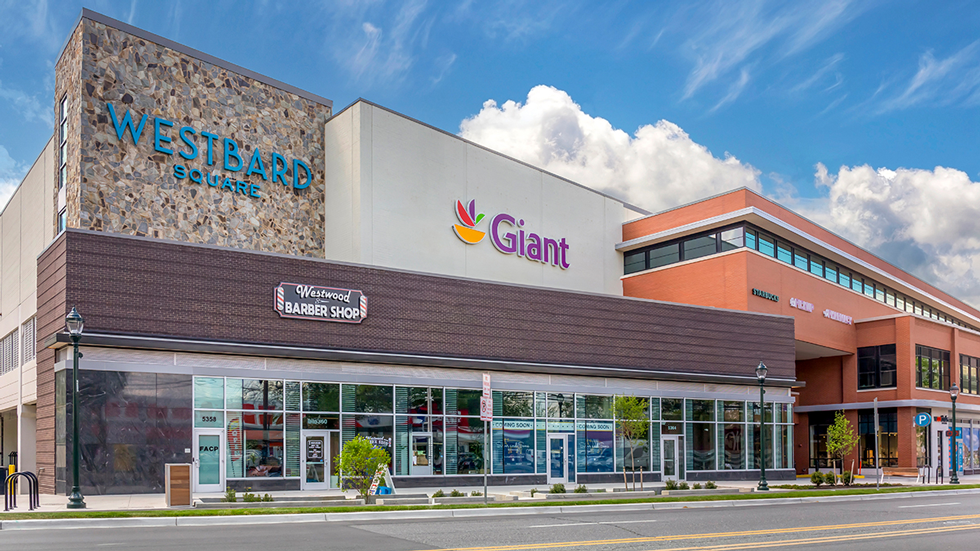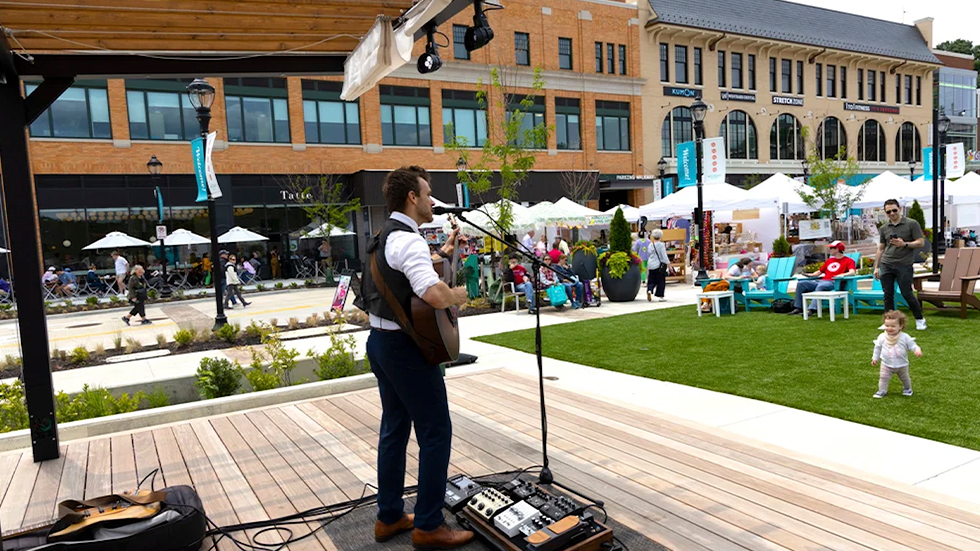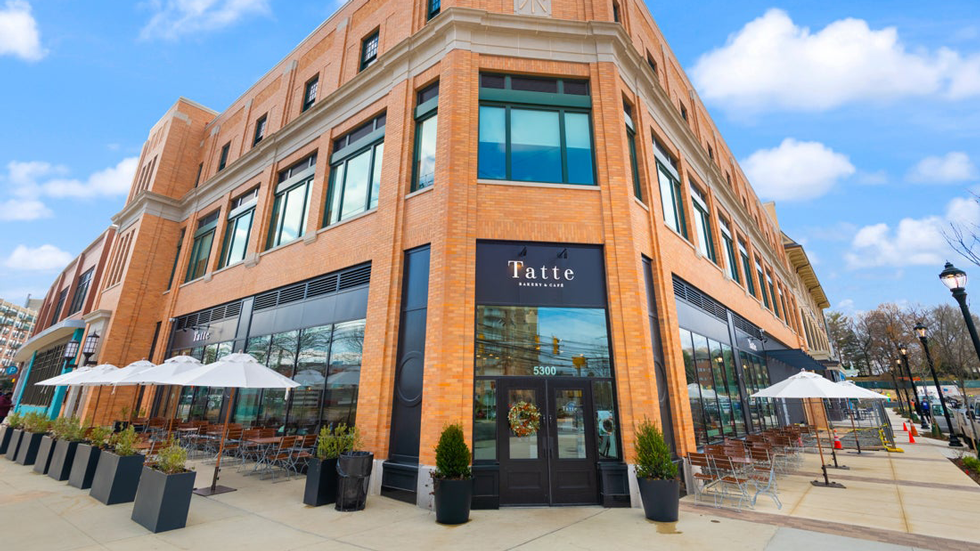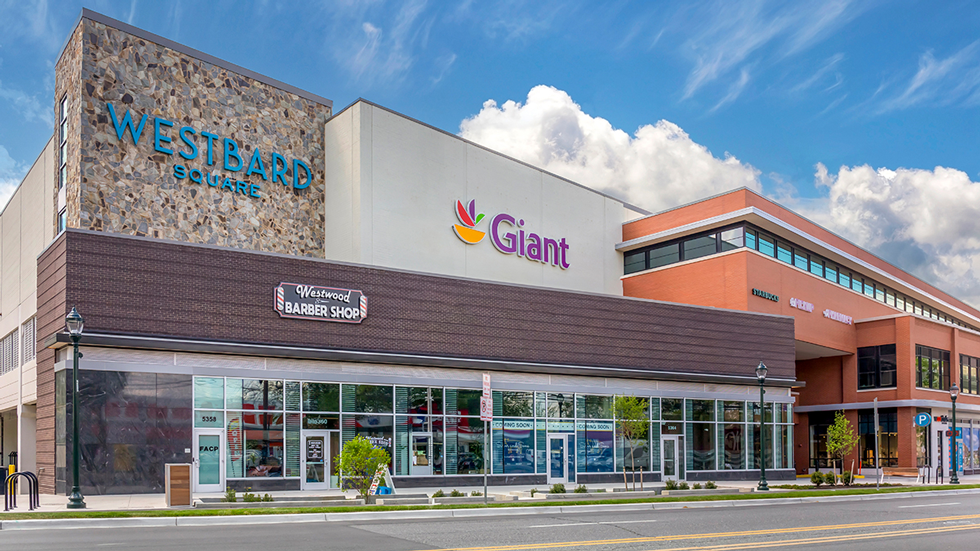
Nearly a decade in the making, Westbard Square is a multi-phase redevelopment in Bethesda, Maryland, shaped by Regency Centers Corp.’s (Nasdaq: REG) retail expertise. The project delivers a thoughtfully planned hub of retail, office, and residential space designed to meet the needs of tenants, neighbors, and the broader community.
Regency acquired Westbard shopping center, the future site of Westbard Square, in 2017 as a result of its merger that year with Equity One, Inc. Equity One purchased the property in 2014. Westbard, originally developed in the late 1950s and early 1960s, was identified as a potential site for redevelopment more than 20 years ago, says Sam Stiebel, vice president of investments for Regency Centers in the Mid-Atlantic region and Boston.
The redevelopment, which encompasses 23 acres, will include a public park, town square, 115 senior living apartments owned by Kensington Senior Living, 100 for-sale townhouses built by EYA (including 13 Moderately Priced Dwelling Units (MPDUs) available through Montgomery County), and a 200-unit apartment by Greystar with ground-floor retail. Anchored by a 70,000-square-foot Giant Food grocery store, Regency recently completed the first LEED Silver certified $37 million phase of the south building, which includes 125,800 square feet of retail and office space.
“We started making plans with Montgomery County just under a decade ago, and then we spoke with community members about plans to understand what they wanted,” Stiebel says. “The community expressed that they wanted this to be a place where they could get things done, so we always intended to keep the existing Giant grocery store and then supplement it with additional neighborhood-serving tenants.”
Regency committed to keeping the grocery store open throughout the construction phase of redevelopment, while at the same time building structured parking for the new and improved Giant store above. That cost additional time and money, Stiebel says, but it was part of their community commitment.
Initial plans for Westbard included more density, but the community wanted a neighborhood scale shopping center rather than a regional one, according to Stiebel. “Neighborhood scale is what we like to do, and we pride ourselves on meeting community needs,” he says.
Local Business Support for Strong Community Ties
From the earliest planning stages, most of the tenants at Westbard were eager for redevelopment.
“We consider ourselves stewards of each community where we operate, so we want to maintain the legacy tenants that are important to the community,” says Andrew Kabat, a senior vice president and senior market officer for Regency Centers’ Mid-Atlantic portfolio.
“At the same time, we like to bring in some new tenants to meet needs that weren’t covered in the past. It’s important to balance those two goals.” In the spirit of “keeping it local,” Regency representatives reached out to Jarrad Silver, who grew up in the neighborhood.
“I was a chef in a restaurant that closed during the pandemic and then a stay-at-home dad while my wife worked in emergency medicine,” Silver says. “I started making barbecue on the weekends for friends and family and industry insiders, then it organically grew into people hiring me to cook for events.” Next, Silver started a successful food truck business, which is how the Regency team found him.
“We like the ‘local boy made good’ story of Silver & Sons barbecue, so we’re really happy that he’s part of Westbard,” Kabat says. Silver had hoped he would eventually open a brick-and-mortar location, and he found Regency accommodative to his needs.
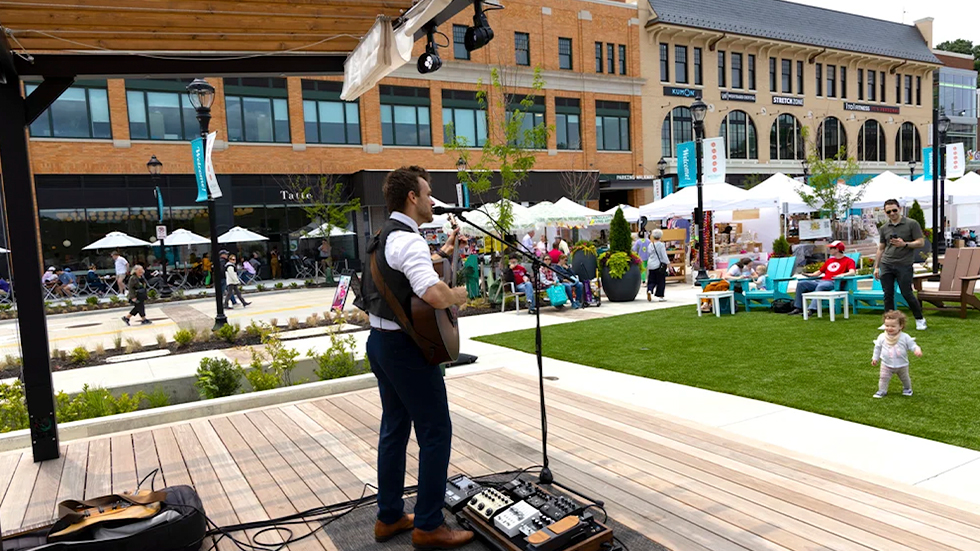
“I grew up in a Jewish household and bring some of that sensibility to my food with challah rolls and short rib pastrami,” Silver says. “Growing up, my family would get takeout Chinese, and I wanted to replicate that experience for families with a small neighborhood takeout place of my own. Regency liked that plan.”
Silver & Sons Barbecue has six counter seats and four outside tables, which suits its needs perfectly. “People come to Westbard two to five times a week to run errands and grab coffee, and Regency focused on just adding to that with local, community-focused restaurants and shops,” Silver says. “The park for families and some outside tables makes it easy for people to pick up food and eat it here when the weather’s nice, or take it home.”
Another Westbard Square tenant, Francis Namin, is no stranger to Bethesda and its dining scene—he opened his first restaurant there in 1994. Today, he owns 11 restaurants in the area including the popular Fish Taco and Piccoli Piatti fast casual restaurants. His latest venture is a second Piccoli Piatti location at Westbard Square.
“As a restauranteur, I look at the location and layout of a development and who’s developing it,” Namin says. “Are they generous? Do they include green space? That’s especially important in a suburban location and for a fast casual restaurant like mine.”
As Namin describes it, Westbard Square has “lots of elbow room” with green space where kids can run around and surface parking for easy access. “It’s important for people to be able to pull up in the parking lot rather than use a garage and elevator just to pick up a takeout order or if they have their kids with them,” Namin says.
Namin opted to give up a little space inside his restaurant in favor of more outdoor seating with heaters, which appeals to his customers who are primarily local. “Westbard touches six zip codes in Bethesda, Chevy Chase, and Northwest D.C., so I think the future is very bright for my restaurant and other tenants here,” Namin says. “This is a family-oriented neighborhood, with a lot of families with three or four kids.”
Catering to Existing Tenants
While they happily worked with new tenants, Kabat and his team also met with every existing tenant at Westbard over several years before construction began.
“Some said, ‘good timing’ because they wanted to update their space, while others were ready to close their businesses after a long run,” Kabat says. “We had a plan in place before the pandemic, but some of the businesses were impacted by Covid.” Among the long list of tenants still at Westbard after the redevelopment are the grocery store, a liquor store, a barber, an optometrist, a Starbuck’s, a nail salon, and the Kumon Learning Center.
“We kept about 50% of our tenants,” Kabat says. “These tenants were all easy to work with, and we were careful when deciding which new tenants to choose that they wouldn’t negatively impact existing tenants.”
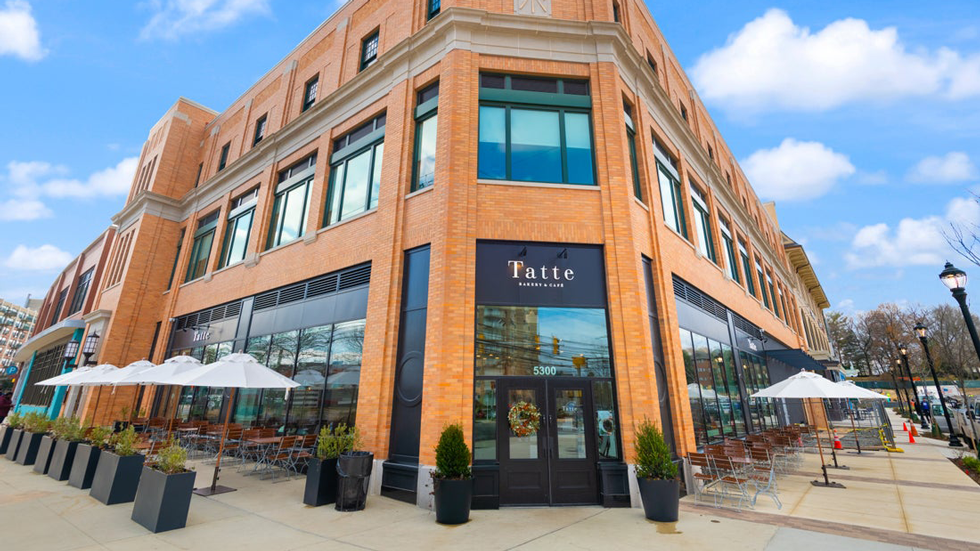
While nearby downtown Bethesda has more of a regional draw for customers, the demographics in this area of Bethesda are also highly desirable. “We always wanted to be a neighborhood-serving center, a place where people can get things done without competing with downtown Bethesda,” Kabat says. “At the same time, we wanted to make this a place where people stay awhile.”
When choosing from a bevy of potential food and beverage tenants, Regency opted for popular genres to avoid the “veto vote” against something too unusual, according to Kabat. They also avoided national chains to keep the center feeling specific to the neighborhood, he says.
Listen and be Flexible
Regency worked closely with Montgomery County officials during the planning stages for Westbard Square.
“For the redevelopment to be effective, we needed to fix traffic and access concerns, which meant relocating the main road into the shopping center,” Stiebel says. “We improved a public park for the county as well as added a central town square to our development for additional green space.”
County officials also had input on the building footprint, construction phasing, and materials to keep Westbard Square complementary to the surrounding area.
“The most important thing we did was listen to the neighbors in their living rooms and kitchens,” Stiebel says. “We also worked with tenants to make sure they had what they needed. We paid a lot of attention to the details people wanted in the design and their concerns about traffic and the public impact.”
Now that Westbard Square is mostly open and Regency’s regional headquarters are located there, the neighbors often let Regency staff know how pleased they are with the outcome.
“We’ve started hosting outdoor events including concerts, yoga, movies on the green, and a farmer’s market,” Kabat says. Meanwhile, a Montgomery County license for outdoor alcohol consumption is planned, “so people could get a glass of wine from Piccoli Piatti and walk to the outdoor green space with it.”
The next phase of development, when the apartment building is complete, will add additional retail space. “We’ll continue to focus on that delicate balance of service-oriented tenants to drive success for all our tenants,” Kabat says. “We’re still about two years out from delivering that space but we’re already getting lots of inquiries from potential tenants.”
Two main takeaways Regency has from their experience with Westbard Square: listen and be flexible, so they can be nimble when amendments to the plan are required, or a tenant needs something unusual.
“We have a lot of insights from our centers, so we’ve learned how important it is to listen to our customers, our tenants, and the local brokerages,” Kabat says. “We make it a point to communicate on a consistent basis throughout every stage from planning to construction to operating a center, and we ask all the stakeholders to communicate with us, too.”
Regency is optimistic that this approach will continue to generate positive returns for investors and positive reviews from customers as the redeveloped shopping center matures.
